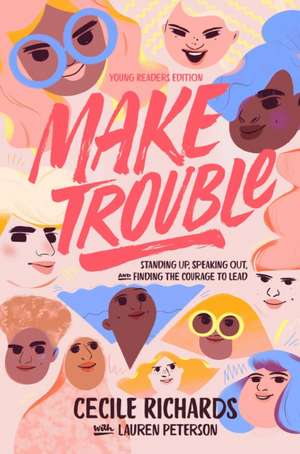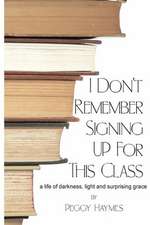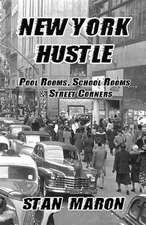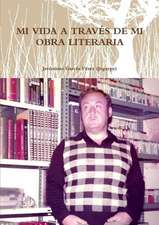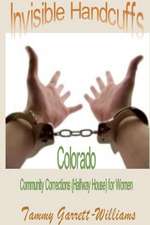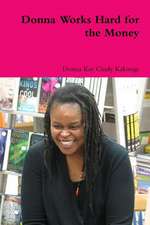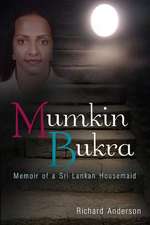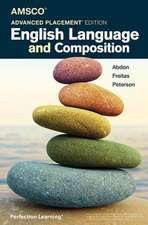Make Trouble: Standing Up, Speaking Out, and Finding the Courage to Lead
Autor Cecile Richards Editat de Ruby Shamir Lauren Petersonen Limba Engleză Hardback – 14 oct 2019 – vârsta până la 14 ani
Cecile Richards has been an activist since she was taken to the principal’s office in seventh grade for wearing an armband in protest of the Vietnam War. Richards had an extraordinary childhood in ultra-conservative Texas, where her civil rights attorney father and activist mother taught their kids to be troublemakers. She had a front-row seat to observe the rise of women in American politics and watched her mother, Ann, transform from a housewife to an electrifying force in the Democratic party.
As a young woman, Richards worked as a labor organizer alongside women earning minimum wage, and learned that those in power don’t give it up without a fight. She experienced first-hand the misogyny, sexism, fake news, and the ever-looming threat of violence that constantly confront women who challenge authority.
Now, after years of advocacy, resistance, and progressive leadership, she shares her “truly inspiring” (Redbook) story for the first time—from the joy and heartbreak of activism to the challenges of raising kids, having a life, and making change, all the while garnering a reputation as “the most badass feminist EVER” (Teen Vogue).
In the “powerful and infinitely readable” (Gloria Steinem) Make Trouble, Richards reflects on the people and lessons that have gotten her through good times and bad, and encourages the rest of us to take risks, make mistakes, and make trouble along the way.
Preț: 101.84 lei
Nou
Puncte Express: 153
Preț estimativ în valută:
19.49€ • 20.84$ • 16.25£
19.49€ • 20.84$ • 16.25£
Carte indisponibilă temporar
Doresc să fiu notificat când acest titlu va fi disponibil:
Se trimite...
Preluare comenzi: 021 569.72.76
Specificații
ISBN-13: 9781534451957
ISBN-10: 1534451951
Pagini: 256
Dimensiuni: 150 x 214 x 27 mm
Greutate: 0.36 kg
Ediția:Young Readers
Editura: Margaret K. McElderry Books
ISBN-10: 1534451951
Pagini: 256
Dimensiuni: 150 x 214 x 27 mm
Greutate: 0.36 kg
Ediția:Young Readers
Editura: Margaret K. McElderry Books
Notă biografică
Cecile Richards is a national leader for women's rights and social and economic justice. She began her career fighting for better wages and working conditions in the labor movement, then moved back home to Texas to help elect the state's first Democratic woman governor: her mother, Ann Richards. She went on to start her own grassroots organizations, and later served as deputy chief of staff to House Democratic Leader Nancy Pelosi. In 2011 and 2012, she was named one of Time magazine's 100 Most Influential People in the World. As president of Planned Parenthood Federation of America and Planned Parenthood Action Fund for more than a decade, Richards worked to increase affordable access to reproduction health care and strengthen the movement for sexual and reproductive rights. She is a frequent speaker and commentator on issues related to women's rights and activism. She and her husband, Kirk Adams, have three children and live in New York City and Maine. She spends most of her free time baking pies.
Extras
Make Trouble
“Little lady, you are just trying to make trouble.”
That was my sixth grade teacher, Mrs. Powers, at University Park Elementary School in Dallas. She had spent the past fifteen minutes conducting an interrogation: Why was I refusing to recite the Lord’s Prayer with the rest of the class?
Mrs. Powers was a lifer at UPS, with permed helmet hair that was the fashion back then. She was a good old gal who probably smoked with the other teachers in the teachers’ lounge. Looking back, I’m not even sure I knew that it was unconstitutional to have us start each day with the Lord’s Prayer—but by God, we did, right after the Pledge of Allegiance. That morning, though, I just wasn’t having it. When Mrs. Powers asked me why I wasn’t participating, I said calmly, “We don’t read the Bible in my house.” Mrs. Powers’s eyes flew open. I could see from her stricken look that she had taken my candor for cheekiness. I suppose in a way it was.
We weren’t a religious family, not in a traditional sense, but we did go to the Unitarian church, which was sort of a home away from home for progressive families like ours in Dallas—our own little bunker in the middle of the crazy culture war of the ’60s, and the heart of the local anti–Vietnam War movement. Folks in our congregation were involved in everything from the United Farmworkers organizing to Notes from the Underground, Dallas’s radical newspaper, which my dad happened to be defending in court. Religion was cool with me; it just didn’t include the Lord’s Prayer. It was pretty obvious from Mrs. Powers’s reaction what she thought about that. There was no hope for me; clearly, I was headed for a life of crime.
Up until then I was the classic all-A’s first child. I lived to make my parents proud of me, which, given their relative youth and inexperience in child-rearing, meant adhering to certain rules. I was the kid who never got in trouble—a trait that annoyed my younger brother, Dan, to no end. I never forgot the shame and humiliation of being called out in front of my class at age eleven. But in that moment I realized something about myself: my parents weren’t the only ones who didn’t fit into the right-wing Dallas establishment. I too was an outlier.
It was the first time I remember having to decide: Do I accept things the way they are, or question authority? I chose the latter, and from that point forward I was branded a troublemaker. Once the initial shock wore off, it became a badge of honor. I’ve been making trouble ever since—which, to me, means taking on the powers that be, being a thorn in someone’s side, standing up to injustice, or just plain raising hell.
Sometimes being a troublemaker can be pretty damn awesome. After all, it was one of the great troublemakers of all time, Emma Goldman, who said, “If I can’t dance, I don’t want to be part of your revolution.” Other times, it’s scary and carries big risks—the risk of losing your job, your friends, your reputation, or all of the above. Over the years I’ve had the good fortune to meet troublemakers from all walks of life: nursing home workers in East Texas, janitors in Los Angeles, members of Congress, organizers and activists of every age on the front lines of the struggle for justice. I’ve watched in awe as my mother, Ann Richards, went from frustrated housewife to governor of Texas, defying convention and the political establishment. That was one of the things that drew me to Planned Parenthood: its history is the history of brave, troublemaking women (and a few good men) who risked their reputations and even their lives to change things. We fellow travelers have a way of finding each other, whether we set out to or not.
This book is the story of the people who have taught me about courage and defiance and making change. It’s also my story, which has been somewhat daunting to write. Like a lot of rabble-rousers (particularly rabble-rousing women), I’m a lot more comfortable talking about my work than myself. But now almost every day people come up to me, usually with a look of distress, to ask, “How are you doing?” They seem to think working for progressive causes is unpleasant or burdensome. The truth is, anything worth doing has its challenges. And, yes, fighting for what you believe in can be discouraging, defeating, and sometimes downright depressing. But it can also be powerful, inspiring, fun, and funny—and it can introduce you to people who will change your life. That’s the message I want to spread far and wide. That’s why I wrote this book.
I started my career organizing women who were working for the minimum wage. There were women in New Orleans who cleaned hotel rooms or did the laundry because only white women got to work the front desk. Women in small-town Texas who used to joke that they’d stick around their job at the local nursing home until a Walmart opened nearby and they could move on to a better—or at least easier—job. Women who were earning a living and didn’t have much choice about the kind of work they did.
As for me, I know full well what a privilege it is to work for social justice. I’ve had the chance to work on historic political campaigns, go toe-to-toe with the Far Right in Texas, and come back years later to occupy the capitol in Austin as part of the fight for abortion rights. I’ve served the first woman to lead her party in the US House of Representatives and the 2.4 million people who count on Planned Parenthood for health care each year. I’ve seen generational progress through the eyes of my three incredible kids. Sure, there have been some brutal moments along the way—appearing before a certain belligerent congressional committee comes to mind, not to mention a couple of awful election nights—but I wouldn’t trade it for anything.
Maybe activism is your avocation, not your vocation. You might even be wondering if it’s worth it—especially now, when nothing seems certain. For the first time in my life, I’m wondering whether my own daughters will have fewer rights than I’ve had. That alone is enough motivation for me to keep making trouble. Maybe you’re thinking that any job that might involve sitting in front of a hostile congressional committee for the better part of a day just isn’t your thing. Well, this book is for you too. You don’t have to be a professional troublemaker to take a stand (though it’s a terrific career path I highly recommend).
This is a once-in-a-lifetime moment to decide who we are—as individuals and as a country. Unless we want to be defined by a stream of divisive late-night tweets (not to name any names), we’re all going to have to be brave. Everywhere I look I see people who are stepping up to do things they never could have imagined. Showing up in a town hall meeting with a US senator, wearing a pink pussy hat. Publicly sharing a personal, intimate story about how Planned Parenthood made a difference in their life. Marching with their kids, grandkids, mothers, sisters, and brothers. Risking arrest to stand up for the rights of immigrants and refugees. Or turning their life upside down to run for office or become a grassroots organizer. If you’re not scaring yourself, you’re probably not doing enough.
Maybe there’s some injustice that’s bothering you; maybe you see something in your community or at work that you want to change; maybe you’re trying to get up the courage to share your beliefs with friends or family who see things differently; maybe you’re worried about the world your kids will inherit. I hope this book will inspire you to get out there and do something about it. Just don’t forget: to make a difference, you have to make a little trouble.
Introduction
“Little lady, you are just trying to make trouble.”
That was my sixth grade teacher, Mrs. Powers, at University Park Elementary School in Dallas. She had spent the past fifteen minutes conducting an interrogation: Why was I refusing to recite the Lord’s Prayer with the rest of the class?
Mrs. Powers was a lifer at UPS, with permed helmet hair that was the fashion back then. She was a good old gal who probably smoked with the other teachers in the teachers’ lounge. Looking back, I’m not even sure I knew that it was unconstitutional to have us start each day with the Lord’s Prayer—but by God, we did, right after the Pledge of Allegiance. That morning, though, I just wasn’t having it. When Mrs. Powers asked me why I wasn’t participating, I said calmly, “We don’t read the Bible in my house.” Mrs. Powers’s eyes flew open. I could see from her stricken look that she had taken my candor for cheekiness. I suppose in a way it was.
We weren’t a religious family, not in a traditional sense, but we did go to the Unitarian church, which was sort of a home away from home for progressive families like ours in Dallas—our own little bunker in the middle of the crazy culture war of the ’60s, and the heart of the local anti–Vietnam War movement. Folks in our congregation were involved in everything from the United Farmworkers organizing to Notes from the Underground, Dallas’s radical newspaper, which my dad happened to be defending in court. Religion was cool with me; it just didn’t include the Lord’s Prayer. It was pretty obvious from Mrs. Powers’s reaction what she thought about that. There was no hope for me; clearly, I was headed for a life of crime.
Up until then I was the classic all-A’s first child. I lived to make my parents proud of me, which, given their relative youth and inexperience in child-rearing, meant adhering to certain rules. I was the kid who never got in trouble—a trait that annoyed my younger brother, Dan, to no end. I never forgot the shame and humiliation of being called out in front of my class at age eleven. But in that moment I realized something about myself: my parents weren’t the only ones who didn’t fit into the right-wing Dallas establishment. I too was an outlier.
It was the first time I remember having to decide: Do I accept things the way they are, or question authority? I chose the latter, and from that point forward I was branded a troublemaker. Once the initial shock wore off, it became a badge of honor. I’ve been making trouble ever since—which, to me, means taking on the powers that be, being a thorn in someone’s side, standing up to injustice, or just plain raising hell.
Sometimes being a troublemaker can be pretty damn awesome. After all, it was one of the great troublemakers of all time, Emma Goldman, who said, “If I can’t dance, I don’t want to be part of your revolution.” Other times, it’s scary and carries big risks—the risk of losing your job, your friends, your reputation, or all of the above. Over the years I’ve had the good fortune to meet troublemakers from all walks of life: nursing home workers in East Texas, janitors in Los Angeles, members of Congress, organizers and activists of every age on the front lines of the struggle for justice. I’ve watched in awe as my mother, Ann Richards, went from frustrated housewife to governor of Texas, defying convention and the political establishment. That was one of the things that drew me to Planned Parenthood: its history is the history of brave, troublemaking women (and a few good men) who risked their reputations and even their lives to change things. We fellow travelers have a way of finding each other, whether we set out to or not.
This book is the story of the people who have taught me about courage and defiance and making change. It’s also my story, which has been somewhat daunting to write. Like a lot of rabble-rousers (particularly rabble-rousing women), I’m a lot more comfortable talking about my work than myself. But now almost every day people come up to me, usually with a look of distress, to ask, “How are you doing?” They seem to think working for progressive causes is unpleasant or burdensome. The truth is, anything worth doing has its challenges. And, yes, fighting for what you believe in can be discouraging, defeating, and sometimes downright depressing. But it can also be powerful, inspiring, fun, and funny—and it can introduce you to people who will change your life. That’s the message I want to spread far and wide. That’s why I wrote this book.
I started my career organizing women who were working for the minimum wage. There were women in New Orleans who cleaned hotel rooms or did the laundry because only white women got to work the front desk. Women in small-town Texas who used to joke that they’d stick around their job at the local nursing home until a Walmart opened nearby and they could move on to a better—or at least easier—job. Women who were earning a living and didn’t have much choice about the kind of work they did.
As for me, I know full well what a privilege it is to work for social justice. I’ve had the chance to work on historic political campaigns, go toe-to-toe with the Far Right in Texas, and come back years later to occupy the capitol in Austin as part of the fight for abortion rights. I’ve served the first woman to lead her party in the US House of Representatives and the 2.4 million people who count on Planned Parenthood for health care each year. I’ve seen generational progress through the eyes of my three incredible kids. Sure, there have been some brutal moments along the way—appearing before a certain belligerent congressional committee comes to mind, not to mention a couple of awful election nights—but I wouldn’t trade it for anything.
Maybe activism is your avocation, not your vocation. You might even be wondering if it’s worth it—especially now, when nothing seems certain. For the first time in my life, I’m wondering whether my own daughters will have fewer rights than I’ve had. That alone is enough motivation for me to keep making trouble. Maybe you’re thinking that any job that might involve sitting in front of a hostile congressional committee for the better part of a day just isn’t your thing. Well, this book is for you too. You don’t have to be a professional troublemaker to take a stand (though it’s a terrific career path I highly recommend).
This is a once-in-a-lifetime moment to decide who we are—as individuals and as a country. Unless we want to be defined by a stream of divisive late-night tweets (not to name any names), we’re all going to have to be brave. Everywhere I look I see people who are stepping up to do things they never could have imagined. Showing up in a town hall meeting with a US senator, wearing a pink pussy hat. Publicly sharing a personal, intimate story about how Planned Parenthood made a difference in their life. Marching with their kids, grandkids, mothers, sisters, and brothers. Risking arrest to stand up for the rights of immigrants and refugees. Or turning their life upside down to run for office or become a grassroots organizer. If you’re not scaring yourself, you’re probably not doing enough.
Maybe there’s some injustice that’s bothering you; maybe you see something in your community or at work that you want to change; maybe you’re trying to get up the courage to share your beliefs with friends or family who see things differently; maybe you’re worried about the world your kids will inherit. I hope this book will inspire you to get out there and do something about it. Just don’t forget: to make a difference, you have to make a little trouble.
Recenzii
“By detailing her own political battles, Cecile Richards has crafted a blueprint for budding activists.... Genial, engaging, and humorous ... If you’re looking for books to fill you with energy for the long haul that lies before us, this one is a great place to start.”
—New York Times Book Review
“For more than a decade, America has known Cecile Richards as the fierce and fearless president of Planned Parenthood. Make Trouble offers a window into her life: the early organizing effort that landed her in the principal’s office; the historic campaign of her mother, Ann Richards, for governor of Texas; her courageous leadership on behalf of women; her travels during the 2016 presidential election; and the lessons she’s learned from the outpouring of activism America has seen since. With humor, heart, and hope, Cecile Richards offers practical advice and inspiration for aspiring leaders everywhere.”
—Hillary Rodham Clinton
“Cecile Richards’s story is powerful and infinitely readable. Whether you are newly ‘woke,’ a longtime activist, or just a caring citizen wondering how to advance democracy in hard times, Make Trouble has the answers. Cecile takes the mystery out of activism, gives you practical examples of how it's done, and tells stories that melt the distance from your front porch to Washington. She is the best teacher on earth—someone you trust.”
—Gloria Steinem
“Make Trouble is a timely reminder that each of us has the power to fight for justice and create the change we want to see. With insight and humor, Cecile Richards offers a call to action for aspiring organizers and leaders. A must-read for anyone hoping to make a difference and trying to figure out where to start.”
—Senator Kamala Harris
“Cecile Richards is whip-smart, clear-eyed, quick-witted, levelheaded and lionhearted. She employs all of these virtues in her fight for women’s health and women’s rights. She’s also employed them in the writing of this wonderful memoir, Make Trouble. The book, like its author, is a powerhouse.”
—Ann Patchett
“With Make Trouble, Cecile Richards—the fiery feminist icon to whom we are indebted—is now also the relatable warrior we adore. By inviting us beyond her frontline fight for justice and into her heart, Richards shows us that a life of activism isn’t reserved for the perfect—it’s for the passionate—and that it’s never too early or too late for women to show up for themselves and each other. In these difficult times in which equality-minded folks are desperate to find purpose and connection, Make Trouble is a roadmap to both.”
—Glennon Doyle
“Cecile Richards is my kind of troublemaker. When she sees inequality and injustice anywhere, she does something about it—with wit, wisdom, and courage. Especially at this moment, there's a lot we can learn from her career spent fighting for women's rights. Make Trouble is exactly the book our country needs.”
—Sheryl Sandberg
“An intimate yet wide-ranging chronicle of a life in the trenches and at the pinnacle of her profession, Richards’ enthralling memoir will provide rousing motivation for anyone passionate about social and political causes.”
—Booklist (starred review)
“[T]he guidelines for starting any organization are spot-on: direct, down-to-earth, and highly practical… A memoir that makes palpable the immense influence of an organization that has improved so many women's lives.”
—Kirkus Reviews
“In this passionate self-portrait, activist Richards maps her road to success from union organizer to her tenure as president of Planned Parenthood, recalling the experiences that shaped her career… It serves as a call to action for women who are mobilizing to make a difference in government and healthcare policies.”
—Publishers Weekly
“Part autobiography, part handbook for the resistance, this inspiring tale of advocacy is a must-read for every Nasty Woman out there.”
—Bustle
“Truly inspiring.”
—Redbook
—New York Times Book Review
“For more than a decade, America has known Cecile Richards as the fierce and fearless president of Planned Parenthood. Make Trouble offers a window into her life: the early organizing effort that landed her in the principal’s office; the historic campaign of her mother, Ann Richards, for governor of Texas; her courageous leadership on behalf of women; her travels during the 2016 presidential election; and the lessons she’s learned from the outpouring of activism America has seen since. With humor, heart, and hope, Cecile Richards offers practical advice and inspiration for aspiring leaders everywhere.”
—Hillary Rodham Clinton
“Cecile Richards’s story is powerful and infinitely readable. Whether you are newly ‘woke,’ a longtime activist, or just a caring citizen wondering how to advance democracy in hard times, Make Trouble has the answers. Cecile takes the mystery out of activism, gives you practical examples of how it's done, and tells stories that melt the distance from your front porch to Washington. She is the best teacher on earth—someone you trust.”
—Gloria Steinem
“Make Trouble is a timely reminder that each of us has the power to fight for justice and create the change we want to see. With insight and humor, Cecile Richards offers a call to action for aspiring organizers and leaders. A must-read for anyone hoping to make a difference and trying to figure out where to start.”
—Senator Kamala Harris
“Cecile Richards is whip-smart, clear-eyed, quick-witted, levelheaded and lionhearted. She employs all of these virtues in her fight for women’s health and women’s rights. She’s also employed them in the writing of this wonderful memoir, Make Trouble. The book, like its author, is a powerhouse.”
—Ann Patchett
“With Make Trouble, Cecile Richards—the fiery feminist icon to whom we are indebted—is now also the relatable warrior we adore. By inviting us beyond her frontline fight for justice and into her heart, Richards shows us that a life of activism isn’t reserved for the perfect—it’s for the passionate—and that it’s never too early or too late for women to show up for themselves and each other. In these difficult times in which equality-minded folks are desperate to find purpose and connection, Make Trouble is a roadmap to both.”
—Glennon Doyle
“Cecile Richards is my kind of troublemaker. When she sees inequality and injustice anywhere, she does something about it—with wit, wisdom, and courage. Especially at this moment, there's a lot we can learn from her career spent fighting for women's rights. Make Trouble is exactly the book our country needs.”
—Sheryl Sandberg
“An intimate yet wide-ranging chronicle of a life in the trenches and at the pinnacle of her profession, Richards’ enthralling memoir will provide rousing motivation for anyone passionate about social and political causes.”
—Booklist (starred review)
“[T]he guidelines for starting any organization are spot-on: direct, down-to-earth, and highly practical… A memoir that makes palpable the immense influence of an organization that has improved so many women's lives.”
—Kirkus Reviews
“In this passionate self-portrait, activist Richards maps her road to success from union organizer to her tenure as president of Planned Parenthood, recalling the experiences that shaped her career… It serves as a call to action for women who are mobilizing to make a difference in government and healthcare policies.”
—Publishers Weekly
“Part autobiography, part handbook for the resistance, this inspiring tale of advocacy is a must-read for every Nasty Woman out there.”
—Bustle
“Truly inspiring.”
—Redbook
